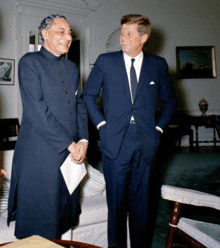Braj Kumar Nehru
|
Braj Kumar Nehru
| |
|---|---|
 Nehru with US President John F. Kennedy at the White House, 1961
| |
| Governor of Gujarat | |
|
In office 26 April 1984 – 26 February 1986 |
|
| Chief Minister | Madhav Singh Solanki |
| Preceded by | K.M. Chandy |
| Succeeded by | R. K. Trivedi |
| Governor of Jammu and Kashmir | |
|
In office 22 February 1981 – 26 April 1984 |
|
| Chief Minister |
Sheikh Abdullah Farooq Abdullah |
| Preceded by | Lakshmi Kant Jha |
| Succeeded by | Jagmohan |
| High Commissioner of India to the United Kingdom | |
|
In office 1973 - 1977 |
|
| Preceded by | Apa Pant |
| Succeeded by | Narayan Ganesh Gore |
| Governor of Manipur | |
|
In office 21 January 1972 - 20 September 1973 |
|
| Chief Minister | Mohammed Alimuddin |
| Preceded by | Office established |
| Succeeded by | Lallan Prasad Singh |
| Governor of Meghalaya | |
|
In office 1 April 1970 - 18 September 1973 |
|
| Chief Minister | Williamson A. Sangma |
| Preceded by | Office established |
| Succeeded by | Lallan Prasad Singh |
| Governor of Nagaland | |
|
In office 17 April 1968 - 18 September 1973 |
|
| Chief Minister |
Thepfülo-u Nakhro Hokishe Sema |
| Preceded by | Vishnu Sahay |
| Succeeded by | Lallan Prasad Singh |
| 10th Governor of Assam | |
|
In office 17 April 1968 – 19 September 1973 |
|
| Chief Minister |
Bimala Prasad Chaliha Mahendra Mohan Choudhury Sarat Chandra Sinha |
| Preceded by | Vishnu Sahay |
| Succeeded by | Lallan Prasad Singh |
| Indian Ambassador to the United States | |
|
In office 1961 - 1968 |
|
| Preceded by | M. C. Chagla |
| Succeeded by | Ali Yavar Jung |
| Personal details | |
| Born |
4 September 1909 Allahabad, United Provinces of Agra and Oudh, British India |
| Died | 31 October 2001 (aged 92) Kasauli, Himachal Pradesh, India |
| Spouse | |
| Children | Ashok Nehru, Aditya Nehru, and Anil Nehru |
| Alma mater | Allahabad University London School of Economics |
Braj Kumar Nehru MBE, ICS (4 September 1909 – 31 October 2001) was an Indian diplomat and Ambassador of India to the United States (1961–1968).
He was the son of Brijlal Nehru and Rameshwari Nehru and first cousin once removed of India's first prime minister Jawaharlal Nehru.
Personal life
Braj Kumar Nehru was born in Allahabad, Uttar Pradesh, India and was son of Brijlal Nehru and Rameshwari Nehru. He was educated at the Allahabad University (India), the London School of Economics and at Oxford University. He was awarded the Doctor of Literature degree by the University of Punjab, for his distinguished services in various fields. His grandfather, Pandit Nandlal Nehru, was the elder brother of Pandit Motilal Nehru. He was the cousin to the erstwhile Prime Minister of India, Indira Gandhi (née Nehru). In 1935, Nehru married Magdolna Friedman (5 December 1908, Budapest, Austria-Hungary - 25 April 2017, Kasauli, Himachal Pradesh, India), a fellow student in the UK who was of a Hungarian Jewish background. The ill-treatment of the Jewish community in Europe prompted her father to change her name to Magdolna Forbath. Her nickname was Fori. After marriage, she changed her name to Shobha Nehru.
Career
National

He joined the Indian Civil Service in 1934 and rose to be governor of seven different states of India. From 1934 to 1937 he held various government positions in the province of Punjab. Nehru became the secretary of economic affairs in 1957. He was appointed Commissioner General for Economic Affairs (external financial relations) of India in 1958. He was Governor of Jammu and Kashmir (1981–84), Assam (1968–73), Gujarat (1984–86), Nagaland (1968–73), Meghalaya (1970–73), Manipur (1972–73) and Tripura (1972–73). He was transferred overnight as the Governor of Jammu & Kashmir to Gujarat after he refused to help Indira Gandhi in destabilising the Farooq Abdullah government.
International
Nehru worked as executive director in the World Bank (1949) and was Economic Minister at the Indian Embassy in Washington (1954). He helped to create the Aid India Club in 1958, which was a consortium of donor nations that committed to donate $2 million for the development of India. He also served as a diplomat, as ambassador to several countries and was offered the post of secretary-general of the United Nations in 1951, but declined. Nehru was also the Indian High Commissioner in London from 1973 to 1977. Braj was chairman of the United Nations Investment committee for 14 years. He represented India in the 'Sterlings balances' negotiations with Britain at the post-Second World War reparations conference.
Writer
Nehru wrote an autobiography titled Nice Guys Finish Second. Mr. Ramesh Kumar Saxena, who worked for him for 35 years, helped writing his biography.
Awards
He was appointed an MBE in the 1945 New Year Honours. He was awarded the Padma Vibhushan in 1999.
The speech "Civil Service in Transition" delivered at the India International Center in New Delhi on 15 October 1999 describes the need and the role played by a strong civil service. It also details the causes for the prevalent corruption in India's political system and civil services.
Death
Nehru died in Kasauli, Himachal Pradesh, India on 31 October 2001 at the age of 92. His body was cremated in Delhi & the memorial service was held amongst the chanting of mantras from the holy scriptures.